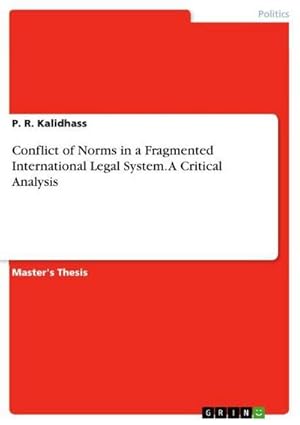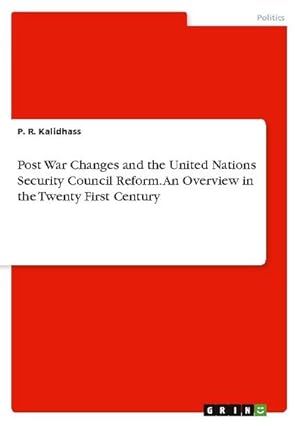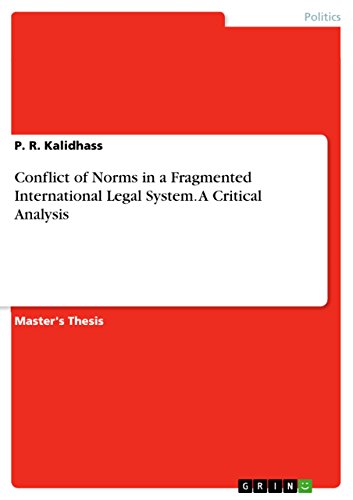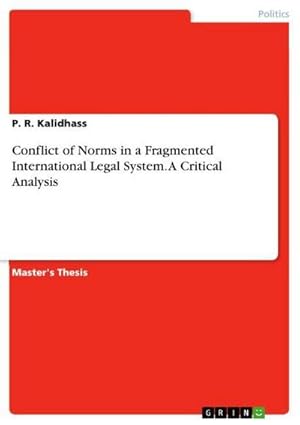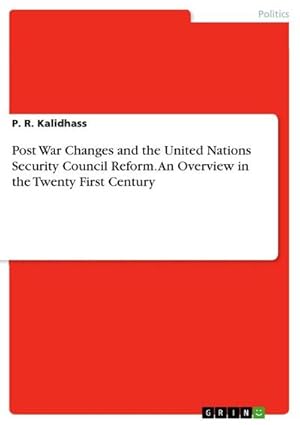P R Kalidhass (6 results)
Product Type
- All Product Types
- Books (6)
- Magazines & Periodicals
- Comics
- Sheet Music
- Art, Prints & Posters
- Photographs
- Maps
-
Manuscripts &
Paper Collectibles
Condition
- All Conditions
- New
- Used
Binding
- All Bindings
- Hardcover
- Softcover
Collectible Attributes
- First Edition
- Signed
- Dust Jacket
- Seller-Supplied Images (4)
- Not Printed On Demand (3)
Seller Location
Seller Rating
-
Conflict of Norms in a Fragmented International Legal System. A Critical Analysis
Published by GRIN Verlag Mai 2014, 2014
ISBN 10: 3656655170ISBN 13: 9783656655176
Seller: BuchWeltWeit Ludwig Meier e.K., Bergisch Gladbach, Germany
Book Print on Demand
Taschenbuch. Condition: Neu. This item is printed on demand - it takes 3-4 days longer - Neuware -Master's Thesis from the year 2010 in the subject Politics - International Politics - Topic: Public International Law and Human Rights, grade: A plus, Jawaharlal Nehru University , course: Master of Philosophy (M.Phil.), language: English, abstract: From the beginning of the twenty-first century the international community started addressing the issue of fragmentation of international law. In 2000, the International Law Commission (ILC) decided to include the topic '[r]isks ensuing from the fragmentation of international law' into its long-term programme of work. This initiative raises some basic questions: is international law a fragmented system If it is so, what is the problem with the fragmentation and how can the problem be resolved This dissertation mainly revolves around these three major issues. It assumes that today's fragmented international law is part of historical evolution or process.In contemporary times, the term 'fragmentation' is commonly used to refer to the slicing up of international law 'into regional or functional regimes that cater for special audiences with special interests and ethos'. The most notable functional regimes are international trade law, environmental law, human rights law, humanitarian law, law of the sea and so on - when there is a collision between these regimes - than the conflict of norms becomes an unavoidable consequence - because each regime seeks favorable treatment towards its own. The absence of normative and institutional hierarchy in international law means that the evolution of such regimes is perceived by some as posing a threat to the coherence, effectiveness and predictability of international law. Others see these regimes as contributing to the development of international law.To respond to the problem of fragmentation, the ILC examined the regimes in detail and tentatively concluded that these specialized legal regimes are merely informal labels wit 292 pp. Englisch.
-
Post War Changes and the United Nations Security Council Reform. An Overview in the Twenty First Century
Published by GRIN Verlag Aug 2023, 2023
ISBN 10: 3346937690ISBN 13: 9783346937698
Seller: BuchWeltWeit Ludwig Meier e.K., Bergisch Gladbach, Germany
Book Print on Demand
Taschenbuch. Condition: Neu. This item is printed on demand - it takes 3-4 days longer - Neuware -Document from the year 2023 in the subject Politics - Topic: Public International Law and Human Rights, grade: A plus, University of Delhi (Faculty of Law (Law Centre-1)), language: English, abstract: The main objective of the study is based on two issues: Whether the Composition and Veto Power of the Security Council need to be democratised or not If it should be democratised, What extent it should be democratised , Why it should be democratised , and How it should be democratised Why the founders of the Organization have given the permanent membership and veto power only to the five members in the Security Council Why we need reform in the Composition and Veto Power of the Security Council in the Twenty First Century Due to various changes in the Security Council as well as in the United Nations Organization (especially after the establishment), the Council proved to be insufficient in its representation and ineffective in its functioning. Hence, the assumption made and built the Security Council by the founders of the Organization was suitable only to the situations of 1945 but not to the contemporary world. Hence, the researcher work makes an attempt to study the Security Council reforms, particularly the provisions of Article 23 and 27 of the UN Charter. Further, the ¿Twenty First Century¿ is the need of hour to bring the Council in a democratic way to strengthen its capacity and effectiveness for the present and future maintenance of international peace and security.At first, the research work would analyse the necessity behind the limited membership and the veto power of the permanent members in the Security Council under the UN. Further, the work will focus on the expectations of the founding fathers of the UN while conferring various powers and functions of the Security Council and the misuse or abuse of such powers and functions by the permanent members for their own sake. However, the research work will also focus on the expectations of the ¿Third World Countries¿ to strengthen the Council¿s capacity and effectiveness in the ¿Twenty First Century¿ for the present and future maintenance of international peace and security. Moreover, the work also analyses the way in which the membership and the veto power of the Security Council shall reform and how can we bring the effective co-operation and secure the interest among the members of each regions of the world by reforming the Council. At last, the research work highlights the increasing number of UN Peacekeeping Operations and the necessity behind the attention of the Security Council in response to intra-state (i.e., internal) conflicts. 228 pp. Englisch.
-
Conflict of Norms in a Fragmented International Legal System. a Critical Analysis
Published by GRIN Verlag GmbH, 2014
ISBN 10: 3656655170ISBN 13: 9783656655176
Seller: Books Puddle, New York, NY, U.S.A.
Book
Condition: New. pp. 292.
-
Conflict of Norms in a Fragmented International Legal System. A Critical Analysis
Published by GRIN Verlag, 2014
ISBN 10: 3656655170ISBN 13: 9783656655176
Seller: AHA-BUCH GmbH, Einbeck, Germany
Book
Taschenbuch. Condition: Neu. Druck auf Anfrage Neuware - Printed after ordering - Master's Thesis from the year 2010 in the subject Politics - International Politics - Topic: Public International Law and Human Rights, grade: A plus, Jawaharlal Nehru University , course: Master of Philosophy (M.Phil.), language: English, abstract: From the beginning of the twenty-first century the international community started addressing the issue of fragmentation of international law. In 2000, the International Law Commission (ILC) decided to include the topic '[r]isks ensuing from the fragmentation of international law' into its long-term programme of work. This initiative raises some basic questions: is international law a fragmented system If it is so, what is the problem with the fragmentation and how can the problem be resolved This dissertation mainly revolves around these three major issues. It assumes that today's fragmented international law is part of historical evolution or process.In contemporary times, the term 'fragmentation' is commonly used to refer to the slicing up of international law 'into regional or functional regimes that cater for special audiences with special interests and ethos'. The most notable functional regimes are international trade law, environmental law, human rights law, humanitarian law, law of the sea and so on - when there is a collision between these regimes - than the conflict of norms becomes an unavoidable consequence - because each regime seeks favorable treatment towards its own. The absence of normative and institutional hierarchy in international law means that the evolution of such regimes is perceived by some as posing a threat to the coherence, effectiveness and predictability of international law. Others see these regimes as contributing to the development of international law.To respond to the problem of fragmentation, the ILC examined the regimes in detail and tentatively concluded that these specialized legal regimes are merely informal labels wit.
-
Post War Changes and the United Nations Security Council Reform. An Overview in the Twenty First Century
Published by GRIN Verlag, 2023
ISBN 10: 3346937690ISBN 13: 9783346937698
Seller: AHA-BUCH GmbH, Einbeck, Germany
Book
Taschenbuch. Condition: Neu. Druck auf Anfrage Neuware - Printed after ordering - Document from the year 2023 in the subject Politics - Topic: Public International Law and Human Rights, grade: A plus, University of Delhi (Faculty of Law (Law Centre-1)), language: English, abstract: The main objective of the study is based on two issues: Whether the Composition and Veto Power of the Security Council need to be democratised or not If it should be democratised, What extent it should be democratised , Why it should be democratised , and How it should be democratised Why the founders of the Organization have given the permanent membership and veto power only to the five members in the Security Council Why we need reform in the Composition and Veto Power of the Security Council in the Twenty First Century Due to various changes in the Security Council as well as in the United Nations Organization (especially after the establishment), the Council proved to be insufficient in its representation and ineffective in its functioning. Hence, the assumption made and built the Security Council by the founders of the Organization was suitable only to the situations of 1945 but not to the contemporary world. Hence, the researcher work makes an attempt to study the Security Council reforms, particularly the provisions of Article 23 and 27 of the UN Charter. Further, the ¿Twenty First Century¿ is the need of hour to bring the Council in a democratic way to strengthen its capacity and effectiveness for the present and future maintenance of international peace and security.At first, the research work would analyse the necessity behind the limited membership and the veto power of the permanent members in the Security Council under the UN. Further, the work will focus on the expectations of the founding fathers of the UN while conferring various powers and functions of the Security Council and the misuse or abuse of such powers and functions by the permanent members for their own sake. However, the research work will also focus on the expectations of the ¿Third World Countries¿ to strengthen the Council¿s capacity and effectiveness in the ¿Twenty First Century¿ for the present and future maintenance of international peace and security. Moreover, the work also analyses the way in which the membership and the veto power of the Security Council shall reform and how can we bring the effective co-operation and secure the interest among the members of each regions of the world by reforming the Council. At last, the research work highlights the increasing number of UN Peacekeeping Operations and the necessity behind the attention of the Security Council in response to intra-state (i.e., internal) conflicts.
-
Conflict of Norms in a Fragmented International Legal System. a Critical Analysis
Published by GRIN Verlag GmbH, 2014
ISBN 10: 3656655170ISBN 13: 9783656655176
Seller: Majestic Books, Hounslow, United Kingdom
Book Print on Demand
Condition: New. Print on Demand pp. 292 424:B&W 5.83 x 8.27 in or 210 x 148 mm (A5) Perfect Bound on Creme w/Matte Lam.


